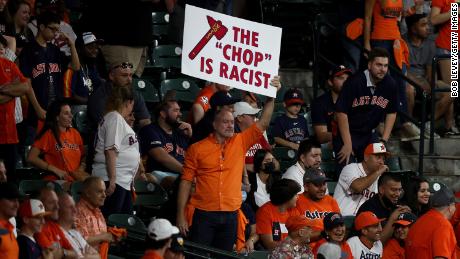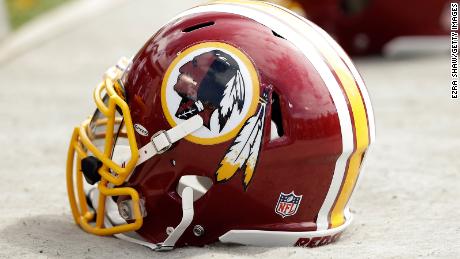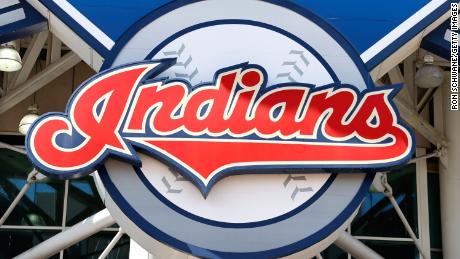(CNN)Native groups and advocates are demanding that the Atlanta Braves eliminate the "Tomahawk chop" symbol and gesture from its branding and game day traditions, saying the team is perpetuating racist stereotypes as the Braves take the national stage in the World Series.
Leaders from the Native community said this week it's past time for the Braves to join other professional sports teams such as the Cleveland Guardians and Washington Football Team in removing offensive imagery and mascots which they say reduce Native people down to caricatures.
Cleveland, formerly the Indians, and Washington, formerly the Redskins, announced last year they were changing their mascots when the nation faced a reckoning on racism. That reckoning was a catalyst not only for sports teams, but also for companies like Quaker Oats, for example, which changed branding and logos that it believed promoted racist stereotypes.
The Braves' name and "Tomahawk chop" have long garnered criticism from Native groups and tribal communities, but the team has stopped short of eliminating the name and Tomahawk symbol or chopping gesture that has been a game day tradition since 1991. Last summer, the Braves said they were reviewing the "chop" amid calls from the Native community.
The conversations about the "chop" were renewed earlier this week when Major League Baseball Commissioner Rob Manfred defended the Braves' name and symbol saying the Native American community in the Atlanta region is "wholly supportive of the Braves program, including the chop. For me, that's the end of the story."
"It's important to understand we have 30 markets around the country," Manfred said before Game 1 of the World Series, according to ESPN. "They're not all the same. The Braves have done a phenomenal job with the Native American community."
The Braves did not immediately respond to a request for comment on the recent criticism and the findings in their review of the "Tomahawk chop" last year.
Crystal EchoHawk, executive director and founder of IllumiNative, said the "Tomahawk chop" is both "racist" and "dehumanizing" for Native people and that the team needs to remove it. EchoHawk said the imagery used by the Braves and other sports teams has created toxic and harmful stereotypes of Native Americans. A lot of the imagery originated in Hollywood and doesn't accurately represent Native people or culture, she said.
"There's zero rationale for the team to hold on to this any longer," EchoHawk said. "I think it says that the franchise is very much a part of perpetuating and condoning racism full stop."
'Native people are not mascots'
Tribal and Native groups have challenged Manfred's stance that Atlanta's Native community supports the Braves.
National Congress of American Indians President Fawn Sharp said in a statement on Wednesday that the concern over the Braves mascot and "Tomahawk chop" is more than just a local issue. Sharp noted that the World Series games played in Atlanta this weekend will be viewed by tens of millions of fans both nationally and internationally.
"Meanwhile, the name 'Braves,' the tomahawk adorning the team's uniform, and the 'tomahawk chop' that the team exhorts its fans to perform at home games are meant to depict and caricature not just one tribal community but all Native people, and that is certainly how baseball fans and Native people everywhere interpret them," Sharp said.
"In our discussions with the Atlanta Braves, we have repeatedly and unequivocally made our position clear -- Native people are not mascots, and degrading rituals like the 'tomahawk chop' that dehumanize and harm us have no place in American society," he said.
Leaders from the Atlanta Indigenous Peoples Association said the Braves have not included them in any discussions about the "Tomahawk chop" and that Manfred's statements are not completely true.
Laura Cummings Balgari, co-director of the association, said while the Native community in Atlanta wants to support the Braves, many feel offended by the team's use of the Tomahawk symbol and chopping gesture. Balgari said she would welcome a conversation with the Braves and a chance to educate the team and fans about the Tomahawk's significance to their culture.
"We are frequently faced with that misrepresentation or that warrior savage imagery that our ancestors were killed for," Balgari said. "Generally, we are represented as artifacts, people that aren't really real ... but we are very much still a part of our tribal communities. We are living, breathing, evolving people just like any other group of people and we'd like to be recognized as that."
The Cherokee Nation, the largest tribe in the US, shared Balgari's sentiment.
A spokeswoman for the tribe said in a statement that face paint, crying war chants and "Tomahawk chop" gestures "mock Native culture as if we are vestiges of the past."
"This does not honor Cherokee traditions, nor do they honor our fellow tribes," the statement said. "The 574 federally recognized Native American tribes are each distinct, sovereign governments with their own unique history, culture and language, and should be respected as such, not as stereotypes or mischaracterizations or derogatory terms."
'Everything needs to go'
Some Native advocates say it's not the Braves name itself that is racist, but the symbols and mascots that have accompanied it over the years.
For example, the Braves' original mascot Chief Noc-A-Homa, who wore a Native American costume on the field, was officially retired in 1986. The Tomahawk chop motion started at Florida State University but was adopted by the Braves in 1991 following the signing of former FSU three-sport star Deion Sanders. In 2019, the Braves said they were taking steps to "reduce" the Tomahawk chop after St. Louis Cardinals player Ryan Helsley, who is a member of the Cherokee Nation, called the chop disrespectful.
Suzan Shown Harjo, a Native rights advocate, said the entire practice of using Native people or culture for sports and entertainment is racist.
In order to respect and consider the wishes of the Native community, the Braves need a clean slate, she said. Harjo said that means the team needs to change its name, mascot, symbol and any offensive game day traditions.
"Everything needs to go because these are understood, are references to us, and there will never be an end to it until everything goes," Harjo said. "The good people of Atlanta, home of so many civil rights advances, should demand it."







